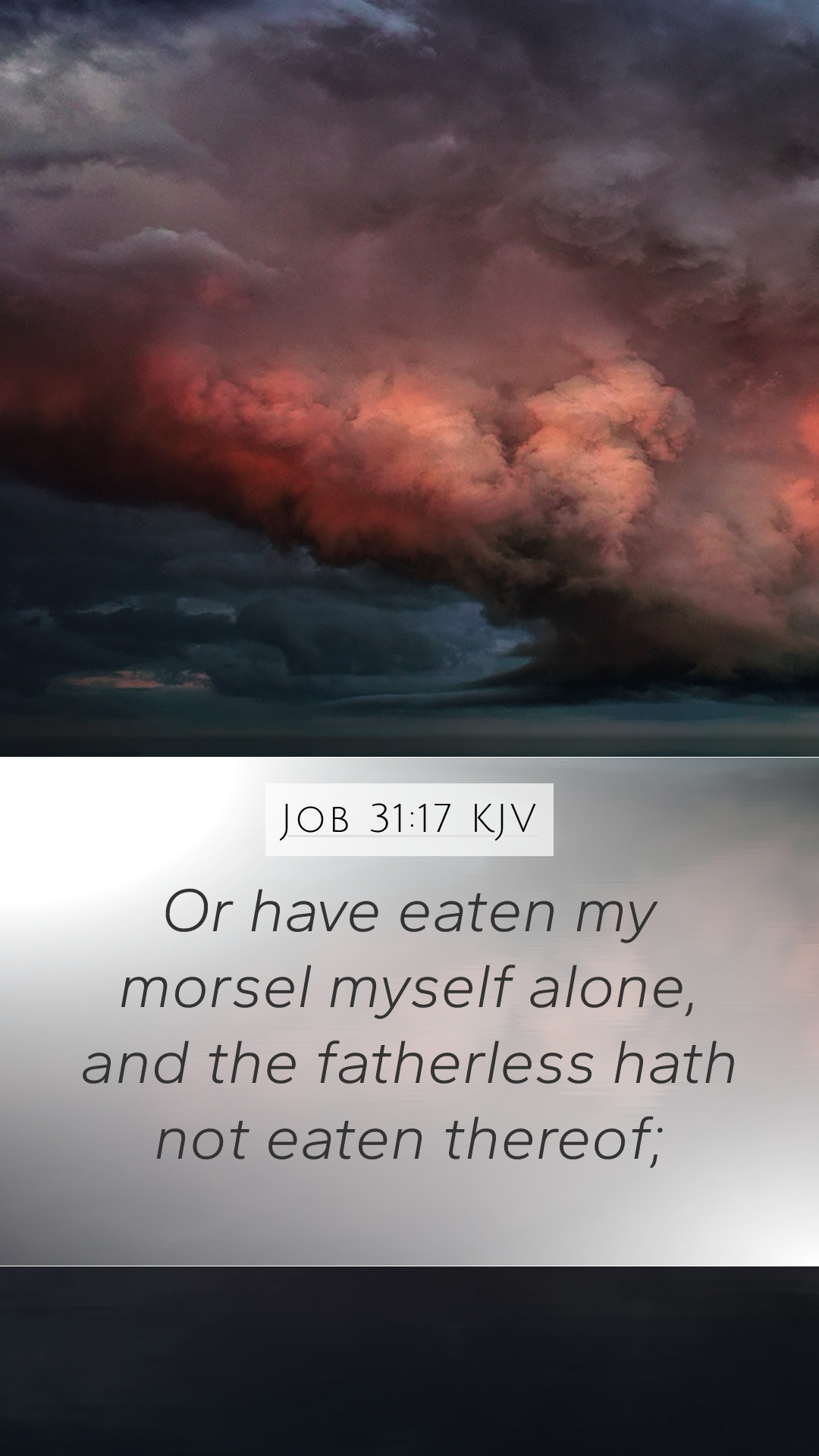Understanding Job 31:17: A Comprehensive Bible Verse Commentary
Job 31:17 states: "Or have eaten my morsel myself alone, and the fatherless hath not eaten thereof."
Bible Verse Meaning and Interpretation
In this verse, Job is passionately defending his integrity and righteousness amidst the accusations made by his friends. He reflects on his treatment of the less fortunate, particularly the orphans, underscoring a key component of his moral character.
Context of Job 31
- Job’s Righteousness: Throughout Chapter 31, Job makes a series of declarations about his righteousness, outlining his moral conduct and the principles by which he lived.
- Defending Integrity: Job feels compelled to defend himself against claims that suggest he is suffering due to secret sin. His references to helping the fatherless demonstrate his commitment to justice and compassion.
Insights from Public Domain Commentaries
Matthew Henry's Commentary
Henry emphasizes that Job’s statement reflects his selflessness. He portrays a character that does not indulge in selfish feasting while neglecting the needs of those who are vulnerable. The underlying principle of charity is highlighted, showcasing that true righteousness encompasses caring for others.
Albert Barnes' Notes
Barnes interprets this verse as a commitment to societal responsibility. He notes that Job's life was characterized by equitable treatment, and he urges that failing to share one's blessings with the needy is the antithesis of true piety. This suggests that one's wealth and resources should be used for the upliftment of others, particularly orphans who represent the most disadvantaged in society.
Adam Clarke's Commentary
Clarke brings to attention the language of the verse, indicating that Job’s rhetorical question serves to reinforce his point about community and responsibility. It implies that Job not only refrained from personal excess but took an active role in ensuring those without resources had enough to eat, reflecting a moral obligation to assist the helpless.
Key Themes in Job 31:17
- Compassion and Responsibility: The verse illustrates a deep awareness of social justice where sharing resources is integral to moral living.
- Integrity in Wealth Management: Job stresses that true wealth is not merely what one possesses but how it is utilized in serving those in need.
- Challenge of Selfishness: The statement serves as a moral challenge against those who may consume their blessings without regard for others.
Application in Modern Context
For contemporary readers, Job 31:17 serves as a poignant reminder of the importance of generosity and community responsibility. It calls individuals to evaluate how they utilize their resources and urges participation in alleviating the struggles of the less fortunate.
Related Bible Cross References
- Proverbs 22:9: "He who is generous will be blessed, for he gives some of his food to the poor."
- James 1:27: "Religion that God our Father accepts as pure and faultless is this: to look after orphans and widows in their distress..."
- Matthew 25:40: "The King will reply, ‘Truly I tell you, whatever you did for one of the least of these brothers and sisters of mine, you did for me.’"
In-depth Biblical Exegesis
The exploration of this verse can be expanded through various Bible study lessons and Bible study tools that emphasize understanding difficult Bible passages. Engaging in online Bible study can enhance one’s interpretation of the moral lessons embedded within Job's declarations.
Structural Analysis of the Verse
Job's use of parallel structure in this verse reveals the contrast between self-satisfaction and community health. By framing the question, he invites readers to reflect on their own practices: are our actions aligned with self-interest or altruism?
Conclusion
Job 31:17 serves not only as a personal declaration of Job's character but also as a timeless challenge to believers today regarding their responsibilities to the marginalized. The insights drawn from commentaries lend a robust understanding of this passage, guiding individuals in their interpretation and application of Scripture in their lives.


